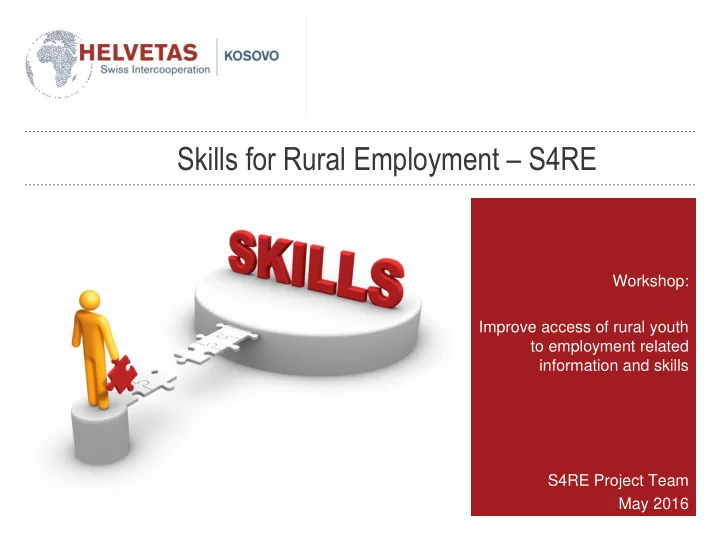

Skills for Rural Employment – S4RE Workshop: Improve access of rural youth to employment related information and skills S4RE Project Team May 2016
Background – S4RE Logo Overall goal: • Improved income and employment opportunities through more appropriate and market- oriented skills Area: • Sharr Mountains and the Southeast of Kosovo Target Groups: • Youth, women and minorities 15-35 • Rural households • Businesses Partners: • Local Field Facilitators • Local Youth Action (LYAC) • Local Action Groups (LAG) • Municipalities ( different departments) • Local and regional businesses • Employment Office • Various local associations and local NGO’s
Logo Learning groups – learning networks - Learning Groups is a methodology deriving from LearnNet Approach - Developed by international organizations addressing skills development challenge in developing countries (Uganda and Tanzania- LSDY/ U-Learn) - LG is a solution-oriented approach - Starts with a problem or a need and generates a group solution to the need - To solve the problem people need skills, knowledge and understanding
Logo Why learning groups – learning networks Access to knowledge, understanding and skills is necessary Investment in schools and universities (public and private) Poor coverage of vocational training Vocational training limit access of rural youth in terms of Location Entrance requirement Program length No flexibility on time and cost
Logo Learning groups – learning networks in practice Key elements of the LG methodology: • The idea for learning and economic activity is based on the real need and demand of the market • The group draws on local resources and social network to find out first what they need to know and then get the information required • The group members take responsibility for organizing their own learning • Learning in a group motivates them and they encourage each other • The group members find ways to finance their own activities • Learning what they need to know has an immediate impact on the lives of group members
Learning Group (LG) Logo What makes LG successful: - Universal access - Holistic approach (Life skills and Entrepreneurship) - Acceptance by local authorities (community, public and private sector) - Facilitator (to mobilize the community and to knit together the network of the group) - (S4RE) facilitate institutionalizing process
Learning Group (LG) process Logo The LG is basic organizational structure of the methodology. LG cares on the following: • Decide on the idea for learning • Planning and organization of the learning process • Identify the potential training provider • Raise funds • Evaluating the results • Groups 5-10 youth. The advantages of LG: • Economic – to share the cost of the training • Managerial – make decisions, organize the training and group representation • Social – mutual support, link interest, friendship etc. • Didactic – to enhance and support individual and collective learning
Learning Group Process Logo Promote the project Provide the training on Provide business plan the chosen topic, through local media, and entrepreneurship include life skills social networks etc. training training (optional) Access to finance Mobilize the youth, First meeting among the Business idea meeting with youth Training cycle RP and LG, set training Skills Development and community to completion and objective, elect the identify the potential creation of business leader, initiate the saving LG ideas (inc. mun. group, set time and plan place of the training officials) Facilitate RMA for the ideas emerged from Business plan Develop DACUM for the meeting, decide on submission for the training, if not training provision for opportunity fund available the feasible ideas Employment Evaluate business plans Inform the youth about Follow up and Identify the RP/trainer as per opportunity fund the decision - create criteria, project mentoring with LF and the LG LGs implementation
Rapid Market Appraisal (RMA) Logo RMA as a complementary tool of LG methodology. R apid M arket A ppraisal is a process of determining market size for a particular occupation in a particular geographical region with the aims of minimizing the skills gap between the skills provided by Training providers and skills required to the employment market. Why RMA? To ensure LG members get training which is: • High Quality • Employment oriented RMA helps to: • Identify number of workers available in a specific occupation in a predetermined area • Identify number of workers required in a specific occupation in a predetermined area • Additional skills desired by employers • Identify available training providers
Conclusion Logo • Tangible result within short period of time • Access to remote population • Involvement of the different actors • Use of local resources (natural, human) • Skills related to labor market requirements • Income generation and involvement of youth into economic activity
Results 2013 - 2015 Logo Main sectors: - Agriculture 1508 - Beekeeping 1600 - Raspberry - Strawberry 1400 - Poultry 945 1200 - Central Heating - Electrical Installation 1000 - Hairdressing 800 - Tailoring 600 - Patisserie - Production of 400 beeboxes 200 - Carpentry - Food processing 0 Youth trained Youth in economic activity - IT 2013 - 2015 - Hospitality - Etc
Recommend
More recommend